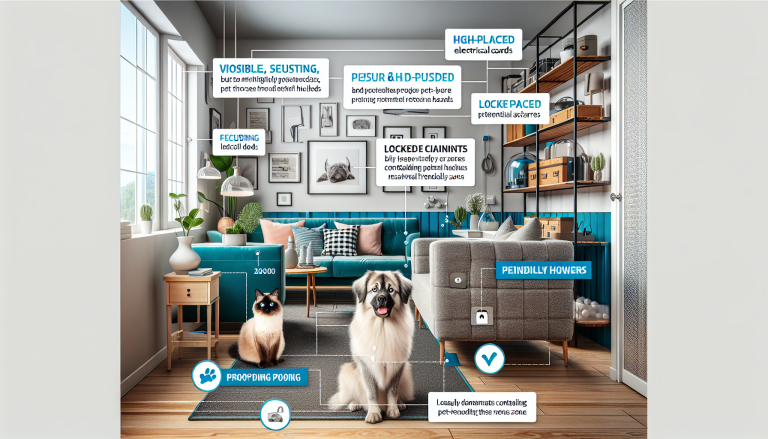So, you’re thinking about getting a pet? That’s fantastic! Before you jump paws-first into the wonderful world of pet ownership, there are a few things you should consider. From understanding the responsibilities that come with caring for another living being, to choosing the right type of pet for your lifestyle, this article aims to provide you with valuable insights and tips to help you make an informed decision. Whether you’re a first-time pet owner or looking to add another fur baby to your family, read on to discover what factors you should carefully ponder before bringing home your new best friend.
Table of Contents
ToggleBudget
Initial costs
Before bringing a pet into your home, it’s important to consider the initial costs associated with owning a pet. This includes the adoption fee or purchase price, as well as any necessary supplies such as a bed, crate, leash, collar, litter box, and food dishes. Additionally, you may need to invest in pet-proofing your home by purchasing gates or protective covers for electrical outlets. It’s important to research the specific needs of the pet you’re considering so that you can accurately estimate these initial costs.
Ongoing expenses
In addition to the initial costs, it’s important to consider the ongoing expenses of owning a pet. This includes the cost of food, grooming, and routine veterinary care such as vaccinations and check-ups. Depending on the pet you choose, there may be additional expenses such as grooming or boarding services, training classes, or pet insurance. It’s important to factor these ongoing expenses into your budget to ensure that you can provide the necessary care for your pet.
Emergency veterinary care
While it’s never pleasant to think about, it’s important to consider the potential for emergency veterinary care. Pets can unexpectedly become ill or injured, and veterinary care can be expensive. It’s important to be prepared for these situations by having an emergency fund or considering pet insurance that can help alleviate the financial burden. Being financially prepared for emergency veterinary care is an essential part of being a responsible pet owner.
Time Commitment
Daily care
Owning a pet requires a significant time commitment, especially when it comes to daily care. Consider the time you can dedicate to feeding, exercising, and interacting with your pet on a daily basis. Different species and breeds have different needs, so it’s important to research the specific requirements of the pet you’re considering. Some pets may require multiple daily walks or play sessions, while others may require minimal daily interaction. Being realistic about the time you can commit to caring for a pet is crucial in ensuring their happiness and well-being.
Exercise and playtime
Most pets require daily exercise and playtime to stay healthy and happy. Dogs, for example, generally require regular walks and active play sessions to burn off energy and maintain their physical and mental well-being. Cats, on the other hand, typically enjoy playtime that involves chasing and pouncing on toys. It’s important to consider your ability to provide regular exercise and playtime for your pet before bringing them into your home. If you have a busy schedule or limited mobility, you may need to consider alternative options such as hiring a dog walker or providing interactive toys for your pet.
Training requirements
Training is an essential part of owning a pet, regardless of their species or breed. Proper training helps establish boundaries, encourages good behavior, and strengthens the bond between you and your pet. Consider the time and effort you’re willing to invest in training before getting a pet. Some pets may require more extensive training, such as puppies who need to be house-trained or dogs who need to learn basic obedience commands. It’s important to be prepared to invest time and patience in training to ensure that your pet develops into a well-behaved member of your family.
Living Arrangements
Space availability
Before getting a pet, it’s essential to assess your living arrangements and determine if you have enough space to comfortably accommodate a pet. Dogs, for example, may require a yard or access to outdoor space for exercise and bathroom breaks. Cats, on the other hand, are typically more adaptable to small spaces but still need ample room for play and exploration. It’s also important to consider the size and activity level of the pet you’re considering, as some breeds may require more space than others. Assessing your space availability is crucial in ensuring that your pet will have enough room to thrive in your home.
Pet-friendly environment
Creating a pet-friendly environment is essential in ensuring your pet’s safety and well-being. This includes securing hazardous items such as cleaning supplies, medications, or toxic plants out of your pet’s reach. It’s also important to remove any choking hazards or small items that your pet could ingest. Depending on the pet you choose, you may also need to invest in items such as scratching posts or climbing trees for cats, or secure fencing for dogs. Creating a safe and pet-friendly environment is important in preventing accidents or injuries in your home.
Neighborhood regulations
Before getting a pet, it’s important to familiarize yourself with any neighborhood regulations that may apply to pet ownership. Some neighborhoods may have specific rules regarding the number or type of pets allowed, as well as leash laws or noise restrictions. It’s essential to research these regulations and ensure that you can comply with them before bringing a pet into your home. Ignoring neighborhood regulations can result in fines or other consequences, so it’s important to be aware of and respect the rules that govern pet ownership in your area.
Allergies and Health Concerns
Potential allergies
If you or any members of your household have allergies, it’s important to consider this before getting a pet. Certain pets, such as cats and dogs, produce allergenic proteins that can trigger allergic reactions in susceptible individuals. It’s recommended to spend time with the specific pet you’re considering before bringing them into your home to see if any allergic reactions occur. Additionally, there are hypoallergenic breeds available for those with allergies, although it’s important to note that no breed is completely allergy-free. Considering potential allergies is crucial in ensuring the health and comfort of everyone in your household.
Existing health conditions
It’s important to consider any existing health conditions in your family before getting a pet. Some pets, such as birds or rodents, may produce dust or dander that can trigger respiratory issues in individuals with asthma or allergies. Additionally, some individuals may have specific allergies or sensitivities to certain types of pets. It’s crucial to consult with healthcare professionals before getting a pet to ensure that their presence will not worsen any existing health conditions. Prioritizing the health and well-being of everyone in your household is essential when making decisions about pet ownership.
Family members’ health considerations
In addition to considering existing health conditions, it’s important to take into account the health considerations of all family members. This includes any physical limitations or mobility issues that may impact your ability to care for a pet. Some pets, such as large dogs, may require more physical strength to handle or care for. Others, such as small animals, may be more suitable for individuals with limited mobility. It’s important to choose a pet that can be safely and comfortably cared for by all members of your family.
Lifestyle Compatibility
Activity level
Matching the activity level of the pet you choose to your own lifestyle is important in ensuring a harmonious living arrangement. Some pets, such as high-energy dog breeds, require a significant amount of exercise and mental stimulation to be happy and well-behaved. If you have an active lifestyle and enjoy outdoor activities, a dog with a high activity level may be a good fit. On the other hand, if you have a more laid-back lifestyle, a lower-energy pet, such as a cat or small reptile, may be more compatible. Considering the activity levels of both yourself and the pet you’re considering is crucial in ensuring a good match.
Socialization needs
Understanding the socialization needs of the pet you’re considering is important in determining if it aligns with your own social preferences. Some pets, such as dogs, thrive on social interaction and require regular opportunities to interact with other animals and people. Others, such as cats or some reptiles, may be more independent and require less socialization. It’s important to assess your own desire for social interaction as well as your ability to provide appropriate socialization opportunities for your pet. Ensuring that your socialization needs align with the pet you choose will contribute to a fulfilling and enriching relationship.
Travel and work schedule
It’s important to consider your travel and work schedule before getting a pet, as it can impact your ability to properly care for them. Some pets, such as dogs, require regular exercise, feeding, and bathroom breaks throughout the day, which can be challenging if you have a demanding work schedule or travel frequently. In such cases, you may need to consider alternative arrangements, such as hiring a pet sitter or utilizing doggy daycare services. Other pets, such as cats or reptiles, may be more adaptable to longer periods of time alone. Assessing your travel and work schedule will help determine if you can provide the necessary care and attention your pet needs.
Long-Term Commitment
Expected lifespan
Before getting a pet, it’s important to consider their expected lifespan. Different species and breeds have varying lifespans, and it’s important to be prepared for the long-term commitment that comes with owning a pet. For example, some small mammals may only live for a few years, while certain dog breeds can live for over a decade. It’s crucial to assess your ability and willingness to care for a pet for their entire lifespan. This includes providing for their physical, emotional, and medical needs as they age. Understanding the lifespan of the pet you choose is essential in making a responsible and informed decision.
Responsibilities over time
As pets age, their needs and requirements may change. Puppies, for example, require more frequent feeding, training, and attention compared to adult dogs. Aging pets may develop specific health issues that require additional care, such as medication administration or assisted mobility. It’s important to consider the responsibilities that may arise as your pet ages and determine if you’re able and willing to provide the necessary support and care. Being prepared for the long-term responsibilities that come with owning a pet is important in ensuring their well-being throughout their life.
Contingency plans
Having contingency plans in place is crucial in case unforeseen circumstances arise that may impact your ability to care for your pet. Life can be unpredictable, and it’s important to have a plan in place for situations such as job loss, relocation, or personal emergencies. This includes identifying a trusted caretaker who can temporarily or permanently care for your pet if needed, as well as ensuring that you have the financial means to provide for your pet’s needs in case of unexpected expenses. Being prepared with contingency plans will give you peace of mind knowing that your pet will be taken care of no matter what life throws your way.
Family Considerations
Children and age-appropriate pets
If you have children, it’s essential to consider their age and ability to interact responsibly with a pet. Young children may not fully understand how to properly handle or care for a pet, and certain pets may not be suitable for households with young children due to their fragility or specific care requirements. Before bringing a pet into your home, research which pets are most compatible with the age of your children. It’s important to supervise interactions between pets and young children and teach them how to interact respectfully and safely.
Compatibility with existing pets
If you already have pets, it’s important to consider their compatibility with a new addition to the household. Some pets may not get along with other animals and may become territorial or aggressive. Before getting a new pet, ensure that your current pets have been properly socialized and are comfortable with other animals. Consider the temperament and energy level of your existing pets and choose a new pet that is compatible with them. Introducing a new pet to your existing pets should be done gradually and under controlled conditions to ensure a smooth integration.
Availability of caretakers
Before bringing a pet into your home, it’s important to consider the availability of caretakers in case you are unable to care for your pet temporarily or permanently. This can include friends, family members, or professional pet sitters who can provide care and attention to your pet when you’re not available. It’s important to have a support system in place to ensure that your pet’s needs can be met even when you’re not able to provide care personally. Assessing the availability of caretakers beforehand will help ensure that your pet will always receive the care and attention they need.
Pet Species and Breed
Researching different species
When considering getting a pet, it’s important to research different species to determine which one is the best fit for your lifestyle and preferences. Each species has its own specific care requirements, activity levels, and socialization needs. For example, dogs are known for their loyalty and need for physical exercise, while cats are typically more independent and require less attention. Other species, such as birds or reptiles, have unique care and housing requirements. Researching different species will allow you to make an informed decision and choose a pet that is compatible with your lifestyle.
Understanding breed characteristics
If you’re considering a specific breed, it’s important to understand the characteristics and traits associated with that breed. Different dog breeds, for example, have different temperaments, energy levels, and exercise requirements. Some breeds may be more prone to certain health issues or may require specific grooming needs. It’s important to research the breed you’re interested in and determine if their characteristics align with your lifestyle and preferences. This will help ensure that you choose a pet that is a good match for your family and can thrive in your care.
Special considerations for exotic pets
If you’re considering an exotic pet, it’s important to be aware of the special considerations and requirements that come with their care. Exotic pets, such as reptiles or amphibians, have unique housing, dietary, and environmental needs. They may require specialized equipment, such as terrariums or heat lamps, as well as access to specific diets or environmental conditions. It’s crucial to research the specific requirements of the exotic pet you’re considering and ensure that you’re able to provide for their unique needs. Exotic pets require specialized care and may not be suitable for all households.
Grooming and Maintenance
Time and effort required
Different pets have different grooming needs, and it’s important to consider the time and effort required to properly maintain their grooming. Dogs with long or curly fur, for example, may require regular brushing, bathing, and professional grooming to prevent matting or skin issues. Cats, on the other hand, are generally more self-sufficient when it comes to grooming but may still require regular brushing to prevent hairballs or mats. Other pets, such as birds or small mammals, may require regular cage or habitat cleaning. Assessing the time and effort required for grooming is crucial in ensuring that you can provide the necessary care for your pet.
Different coat types
If you’re considering a pet with fur, it’s important to understand the different coat types and their associated grooming needs. Some pets have long, dense fur that requires regular brushing to prevent matting and tangling. Others have short, low-shedding coats that require minimal grooming. It’s important to consider your preferences and comfort level with grooming when choosing a pet. Additionally, pets with allergies or respiratory issues may require hypoallergenic breeds or low-shedding pets to minimize potential allergens in the home. Understanding different coat types and their care requirements will help ensure that you can properly maintain your pet’s coat.
Grooming expenses
Grooming expenses can vary depending on the type of pet you choose and their specific grooming needs. Dogs, for example, may require regular professional grooming, which can be costly. Cats, on the other hand, typically require less professional grooming but may still benefit from occasional visits to remove excess hair or trim their nails. It’s important to consider the potential grooming expenses associated with the pet you’re considering and factor them into your budget. Regular grooming is essential in maintaining your pet’s health and appearance, so it’s important to invest the necessary time and resources in their grooming needs.
Training and Socialization
Training requirements
Training is an important aspect of owning a pet, regardless of their species or breed. Dogs, for example, often require obedience training to ensure they understand basic commands and are well-behaved. Cats can also benefit from basic training, such as litter box training or teaching them to use a scratching post. Other pets, such as birds or small mammals, may be trainable in terms of basic handling or socialization. It’s important to research the specific training requirements of the pet you’re considering and determine if you’re willing and able to invest time and effort in their training needs.
Socialization opportunities
Providing socialization opportunities for your pet is crucial in ensuring their well-being and happiness. Dogs, for example, need regular socialization with other animals and people to prevent behavioral issues and promote positive interactions. Cats, on the other hand, typically require less socialization but still benefit from exposure to different environments and stimuli. Assessing your ability to provide appropriate socialization opportunities for your pet is important in ensuring their social development and overall quality of life. Providing socialization opportunities can include visits to dog parks, playdates with other pets, or exposing your pet to different environments and experiences.
Professional help if needed
If you’re unsure of how to properly train or socialize your pet, it’s important to seek professional help. Trainers or behaviorists who specialize in the species or breed of your pet can provide valuable guidance and support in ensuring that your pet receives proper training and socialization. They can help address any behavioral issues or challenges that may arise and provide personalized strategies for your specific pet. Investing in professional help, if needed, is an important part of being a responsible pet owner and ensuring that your pet receives the care and guidance they need to thrive.
Owning a pet is a rewarding and fulfilling experience, but it’s important to carefully consider the factors outlined above before making the commitment. By taking into account your budget, time commitment, living arrangements, allergies and health concerns, lifestyle compatibility, long-term commitment, family considerations, pet species and breed, grooming and maintenance, as well as training and socialization, you’ll be well-equipped to make an informed decision and choose a pet that will bring joy and companionship into your life. Remember, thorough research and preparation are key to ensuring a happy and healthy relationship with your new furry, feathery, or scaly friend.








